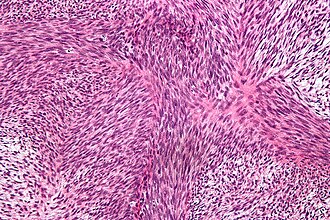Difference between revisions of "Malignant peripheral nerve sheath tumour"
Jump to navigation
Jump to search
(→Images) |
|||
| Line 62: | Line 62: | ||
Image:Malignant_peripheral_nerve_sheath_tumour_-_intermed_mag.jpg | MPNST - intermed. mag. (WC) | Image:Malignant_peripheral_nerve_sheath_tumour_-_intermed_mag.jpg | MPNST - intermed. mag. (WC) | ||
Image:Malignant_peripheral_nerve_sheath_tumour_-_high_mag.jpg | MPNST - high mag. (WC) | Image:Malignant_peripheral_nerve_sheath_tumour_-_high_mag.jpg | MPNST - high mag. (WC) | ||
Image:Malignant_peripheral_nerve_sheath_tumour_-_very_high_mag.jpg | MPNST - very high mag. (WC) | |||
</gallery> | </gallery> | ||
www: | www: | ||
Revision as of 06:56, 1 November 2014
| Malignant peripheral nerve sheath tumour | |
|---|---|
| Diagnosis in short | |
 MPNST. H&E stain. | |
|
| |
| LM | spindle cell lesion (or very rarely epithelioid lesion) with nuclear atypia, mitotic activity, +/-herring bone pattern |
| Subtypes | malignant triton tumour |
| LM DDx | synovial sarcoma, fibrosarcoma, cellular schwannoma, plexiform schwannoma |
| Site | soft tissue |
|
| |
| Associated Dx | neurofibroma, plexiform neurofibroma |
| Syndromes | neurofibromatosis type 1 |
|
| |
| Signs | mass |
| Prognosis | poor |
Malignant peripheral nerve sheath tumour, abbreviated MPNST, is an uncommon malignant tumour of the nerve sheath.
It is also known neurofibrosarcoma[1] and neurogenic sarcoma.[2]
General
- Malignant - as the name implies.
- Usually assoc. with a peripheral nerve.[citation needed]
- May be seen in the context of neurofibromatosis type 1.
Microscopic
Features:
- Cellular - usu. spindle cells.
- Very rarely epithelioid.[3]
- Nuclear atypia.
- Mitoses.
- +/-Herring bone pattern.
Notes:
- May be diagnosed in a poorly diff. tumour if patient has NF1.
DDx:
- Cellular schwannoma.
- Plexiform schwannoma.
- Malignant triton tumour.
DDx of herring bone:
- MPNST.
- Synovial sarcoma.
- Fibrosarcoma.
Images
www:
Grading
Sarcoma grading system[6] - based on:
- Tumour differentiation.
- Mitotic rate.
- Necrosis.
IHC
Features:[7]
- S-100 +ve ~ 30% of tumours.
- SOX10 +ve ~ 50% of tumours.
Others:[4]
- p53.
- p16.
- p27.
- MIB1.
See also
References
- ↑ Mills, AM.; Karamchandani, JR.; Vogel, H.; Longacre, TA. (Mar 2011). "Endocervical fibroblastic malignant peripheral nerve sheath tumor (neurofibrosarcoma): report of a novel entity possibly related to endocervical CD34 fibrocytes.". Am J Surg Pathol 35 (3): 404-12. doi:10.1097/PAS.0b013e318208f72e. PMID 21317712.
- ↑ Sham, ME.; Ghorpade, A.; Shetty, S.; Hari, .; Vinay, . (Mar 2010). "Malignant peripheral nerve cell tumour.". J Maxillofac Oral Surg 9 (1): 68-71. doi:10.1007/s12663-010-0019-6. PMID 23139572.
- ↑ Carter, JM.; O'Hara, C.; Dundas, G.; Gilchrist, D.; Collins, MS.; Eaton, K.; Judkins, AR.; Biegel, JA. et al. (Jan 2012). "Epithelioid malignant peripheral nerve sheath tumor arising in a schwannoma, in a patient with neuroblastoma-like schwannomatosis and a novel germline SMARCB1 mutation.". Am J Surg Pathol 36 (1): 154-60. doi:10.1097/PAS.0b013e3182380802. PMID 22082606.
- ↑ 4.0 4.1 Zhou H, Coffin CM, Perkins SL, Tripp SR, Liew M, Viskochil DH (October 2003). "Malignant peripheral nerve sheath tumor: a comparison of grade, immunophenotype, and cell cycle/growth activation marker expression in sporadic and neurofibromatosis 1-related lesions". Am. J. Surg. Pathol. 27 (10): 1337–45. PMID 14508395.
- ↑ Kar M, Deo SV, Shukla NK, et al. (2006). "Malignant peripheral nerve sheath tumors (MPNST)--clinicopathological study and treatment outcome of twenty-four cases". World J Surg Oncol 4: 55. doi:10.1186/1477-7819-4-55. PMC 1560134. PMID 16923196. https://www.ncbi.nlm.nih.gov/pmc/articles/PMC1560134/.
- ↑ Trojani M, Contesso G, Coindre JM, et al. (January 1984). "Soft-tissue sarcomas of adults; study of pathological prognostic variables and definition of a histopathological grading system". Int. J. Cancer 33 (1): 37–42. PMID 6693192.
- ↑ Nonaka D, Chiriboga L, Rubin BP (September 2008). "Sox10: a pan-schwannian and melanocytic marker". Am. J. Surg. Pathol. 32 (9): 1291–8. doi:10.1097/PAS.0b013e3181658c14. PMID 18636017.


